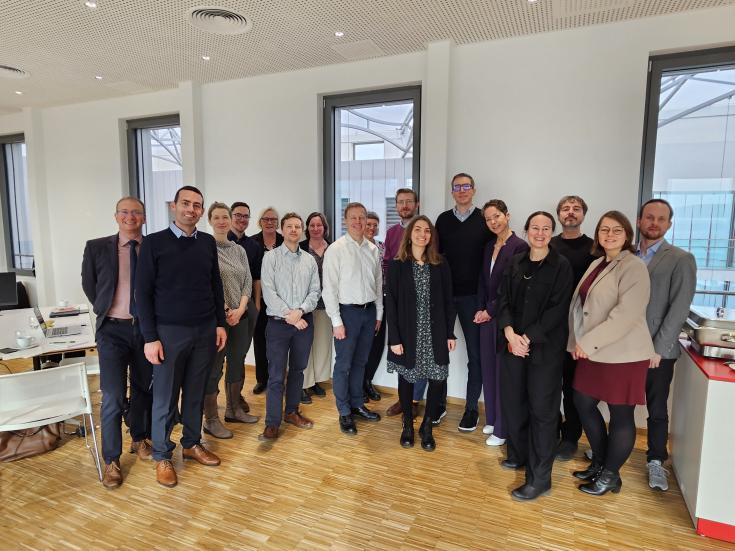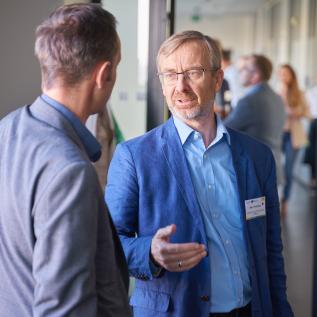CO2 impact assessment methodologies for applicants and funding program owners

On 30-31 January 2024, the Policy Learning Platform held an onsite peer review for the Ministry of Economic Affairs, Energy, Transportation, and Housing from German State of Hesse, which requested advice regarding their policy challenge on assessing applicants for funding based on the potential CO2 impact of the projects.
Peers from across Europe
Alongside Katharina Krell and Magda Michaliková, our Thematic Experts on ‘Greener Europe’, six excellent peers participated in the peer review:
- Amy Peace, Innovation Lead - Circular Economy, Materials and Manufacturing, Innovate UK, UK
- Gertrud Aichberger, Energy & Environment, FFG - Austrian Research Promotion Agency, AT
- Lars Friberg, Climate strategist, Innovation management, VINNOVA, SE
- Warren McIntyre, Programme Manager, Zero Waste Scotland, UK
- Clyde Falzon Bouvett, Team Manager Operations, Environment & Resources Authority, MT
- Eva Sevigne, Environmental Management of Navarra, GAN, ES
Recommendations
Given the innovative nature of the topic, part of the peer review has been facilitated through the World Café sessions, where the host’s questions were thoroughly addressed. All peers and stakeholders engaged in an interesting discussion on rather technical aspects of CO2 assessment methodologies, debating baselines, data sets, boundaries for comparison and trade-offs between CO2 and other impacts.
As a result, several recommendations were established.
- Funding programmes should follow political priorities; this should be reflected in the evaluation criteria. To decide where funding should be focused, the Ministry needs to consider regional aspects.
- The CO2 impact of projects is just one of the possible environmental impacts, and there are potential trade-offs among environmental criterial, but also among environmental criteria and e.g. regional economic and social priorities.
- The development of a new single tool to assess CO2 impact of various process technologies is very complex and appears too ambitious for the type and size of projects currently supported by the Ministry. However, for very large projects, external advisors for comprehensive CO2 calculations or a full-fledged LCA can be beneficial.
- A qualitative multicriteria analysis resulting in a scoring matrix would be a more feasible option. It would allow to decide which criteria to evaluate, and which of these to weigh stronger to support policy goals.
- The same group of evaluators should assess all projects, if possible, to have them all judged on the same baseline.
- To ensure thematic spread of the funding programme, a complementary portfolio of projects could be supported that helps to reach the goals collectively. The call could mention the desired applications. Future calls could be more focussed, if some areas remain under-served.
- Offering funding for feasibility studies would allow to determine which projects have higher chance of scaling.
Following the discussions of the first day, the Ministry decided to not develop a complicated quantitative tool to assess the CO2 impact of applications and rather build a new evaluation system with a multi-criteria scorecard, to help with qualitative and quantitative assessment of projects.
The peers and stakeholders helped to develop specific questions for the scorecard in five categories: environmental, strategic alignment with the call objectives, economic, social and qualitative.
Happy with the outcome of the exchange on this very technical and complicated topic, Sebastian Hummel, Policy Advisor from the Ministry of Economic Affairs, Energy, Transport and Housing of the State of Hessen commented:
Follow-up report
Download the follow-up report from this peer review below.
Peer review follow-up report on CO2 impact assessment methodologies

“Thank you to the peers for donating your time for free, I didn't expect such a great outcome. It was an amazing experience to be able to talk to people who understand what I'm talking about and are able to share their ideas and discuss. Thank you very much for that.”
More about these and other recommendations will be shared shortly in the follow-up report.

Peer review publication
Find more information on the methodology and experiences of previous beneficiaries in our publication.

Apply for a peer review
Start your peer review application process today and find solutions to your policy challenge with our expert and peers!
